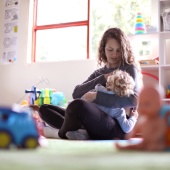What’s it like being pregnant or looking after a newborn when you already have an older baby? How to manage the early days of parenting more than one child.
Having a second, third or subsequent child can be a wonderful addition to your family. However being pregnant while parenting another baby or toddler can be more challenging than pregnancy without looking after any other children.
There might be less time for self-care when pregnant. It can also be tough looking after a preschooler when feeling sick or tired during pregnancy. These ideas might help.
Our supportive NCT New Baby courses can also help new parents feel informed and confident.
Pregnancy with an older child
A smaller age gap between siblings might feel tougher as the older child still needs a lot of care. However, they may still have longer and more frequent naps where the pregnant woman or person can also get some rest.
Meanwhile a bigger gap can mean the older child (or children) is more helpful, but they may find the arrival of the new baby unsettling.
Ideas for parenting while pregnant
- Start to encourage the older child to do simple things like dress, or get into a car seat by themselves. This takes some pressure off the parent and helps the older child develop skills and self-reliance.
- When tired or feeling unwell, read together or play games to keep them occupied. It's also good for your child's development.
- Maintaining 150 minutes of moderate exercise a week is encouraged and won’t harm the baby. So taking an older child for a walk to the park will have benefits for everyone (Gov.uk, 2019).
- Protect the bump and be cautious about stretching and lifting while looking after the older child or doing exercise.
- Take advantage of any support from family or friends.
Preparing the older child for a sibling
- Help the older child bond with the bump by encouraging them to talk to the baby or feel them kicking. Kicks might be noticed a couple of weeks earlier for a second than first pregnancy (RCOG, 2019).
- Prepare the older child by reading stories together about a new baby joining the family.
- Talk to them about the baby and the plans for how they will be cared for when the parent goes into labour.
- They might like to think about ways they can help with the baby, for example fetching clean nappies or clothes when the baby is being changed.
Getting ready for another child
It can help to prepare for having increased demands on your time by:
- Asking people for tips on managing two or more children.
- Batch cooking if possible before the baby is born, and keeping food supplies stocked up as the due date approaches.
- If people want to offer a gift, suggest a meal delivery when the baby comes.
- Prioritising rest when the opportunity arises.
Carrying your baby while pregnant
It’s fine to continue carrying an older child or wearing a sling while pregnant if there are no health concerns (Knowles R, No date). Avoiding lopsided carrying is recommended if there is Pelvic Girdle Pain (PGP). See our article.
Breastfeeding while pregnant
If the parent and baby would like to, breastfeeding can continue while pregnant. The growing baby will still get enough nutrients if the pregnant woman or person has a varied, balanced diet. Breastfeeding while pregnant has no effect on the milk supply after the baby is born (La Leche League, 2016).
Calcium needs increase during pregnancy and breastfeeding. Leafy greens, nuts and seeds can help build up calcium reserves. With a healthy diet there is no increased risk of osteoporosis (La Leche League, 2016).
In the case of pregnancy with twins or multiples, or if there is thought to be a risk of miscarriage, you could discuss the situation with a breastfeeding counsellor (La Leche League, 2016).
Breastfeeding might make pregnancy nausea or sickness feel worse, but rest and regular snacks can help (La Leche League, 2016).
It is common for milk production to decrease in the fourth or fifth month due to pregnancy hormones. Feeding more or pumping won’t increase milk production. If your baby is under 12 months, you might want to keep an eye on their weight and supplement if necessary (La Leche League, 2016).
If you are not enjoying breastfeeding
During pregnancy, the pregnant woman or parent might experience increased nipple soreness and nausea, tiredness or feelings of irritability (La Leche League, 2016). There may be an uncomfortable feeling of the breasts not keeping up with demand.
Reducing length of feeds or distracting your baby with something else might help get through this tricky period (La Leche League, 2016).
If you don’t want to breastfeed any longer
See our article on how to safely stop or reduce breastfeeding.
Attending antenatal appointments and the birth
Second or subsequent pregnancies usually have seven antenatal appointments, compared with ten for a first pregnancy (NHS, 2023). That’s unless the pregnancy is more complicated or lasts longer, in which case there will be additional appointments (NICE, 2021).
For most straightforward appointments you will be able to take your older child into the appointment with you. The exception could be ultrasound scans. So consider who might be able to come with you to look after the older child, or where you could comfortably leave them.
Depending on where you plan to give birth, there may be restrictions on who can visit you in labour and after the birth. This might affect your decision on where to give birth. See our article on planning place of birth.
Will this birth be the same as last time?
There is a lower chance of interventions or problems for the baby in labour for second or subsequent births (NPEU, 2011). The active second stage of labour is shorter after a first baby (NICE, 2023). With no other medical issues, there is no difference in the care offered in a second birth (NICE, 2023).
All places of birth are equally as safe for the baby for second or later births (NICE, 2023). It’s common for parents to make different decisions around birth when they have more experience. This is something that can be discussed on an NCT Antenatal course.
Making arrangements for childcare during the birth
Wherever your baby will be born, make sure someone is on standby to look after your older child. This might be at your home or theirs.
They should understand that this might be at short notice, at the weekend or during the night. So it should be someone your child knows well and has looked after them before. You can also plan what will happen if you stay in hospital for a few days after the birth.
Caring for an older baby and newborn
Support while recovering from birth can make a huge difference to physical and mental wellbeing. Plan beforehand who might be available within your family, friends, or wider network. Talk to everyone in advance about what could be helpful, or consider booking a postnatal doula.
On a physical level, most people will find it easier to do things when no longer heavily pregnant. However, it’s also important to allow the body time to recover as each pregnancy takes an additional toll on the body.
Although sleep may feel more interrupted by a newborn, the actual quality of sleep may feel better than during late pregnancy.
Tips to manage two children under two
- Accept that most people do need extra help, so plan for that even if it feels like something you wouldn’t normally do.
- Unless it would make you feel uncomfortable, accept the help that’s offered, like a cooked meal or a trusted friend taking the older child to the park for a walk. Don’t feel you need to return the favour.
- The older child could help entertain or look after the baby. This can promote bonding and responsibility. Always supervise this care and play unless the older child is of a responsible age.
- Make sure the older child is still getting attention from all family members. This can reassure them and help them with the transition.
- Using a sling or carrier can be useful for carrying your newborn while looking after an older child. Follow the TICKS guidelines for safe use of a sling.
- Tandem breastfeeding means feeding an older and younger child at the same time. It can maintain and promote bonding and help the older child with the transition (La Leche League GB, 2016). See our breastfeeding pages or call our Breastfeeding Counsellors on 0300 330 0700 for support.
Further information
Our in-person NCT Antenatal courses give you up-to-date, evidence-based information to help you make decisions about your birth, your baby, your options.
Find out more about life after you've had a baby on our NCT New Baby course. It supports new parents and their babies, leaving you feeling confident, knowledgeable and relaxed.
Gov.uk (2019) Physical activity for pregnant women (text of the infographic). https://www.gov.uk/government/publications/physical-activity-guidelines… [26 Sep 24]
Knowles R (No date) Carrying while pregnant. https://www.carryingmatters.co.uk/carrying-while-pregnant/ [25 Sep 24]
La Leche League GB (2016) Pregnant and breastfeeding. https://laleche.org.uk/pregnant-and-breastfeeding/ [25 Sep 24]
NHS (2023) Your antenatal appointments. https://www.nhs.uk/pregnancy/your-pregnancy-care/your-antenatal-appoint… [25 Sep 24]
NICE (2021) Antenatal care [NG201]. https://www.nice.org.uk/guidance/ng201/ [25 Sep 24]
NICE (2023) Intrapartum care [NG235]. https://www.nice.org.uk/guidance/ng235 [25 Sep 24]
NPEU (2011) Perinatal and maternal outcomes by planned place of birth for healthy women with low risk pregnancies: the Birthplace in England national prospective cohort study BMJ 2011; 343 :d7400 https://doi.org/10.1136/bmj.d7400
RCOG (2019) Your baby’s movements in pregnancy. https://www.rcog.org.uk/for-the-public/browse-our-patient-information/y… [25 Sep 24]







